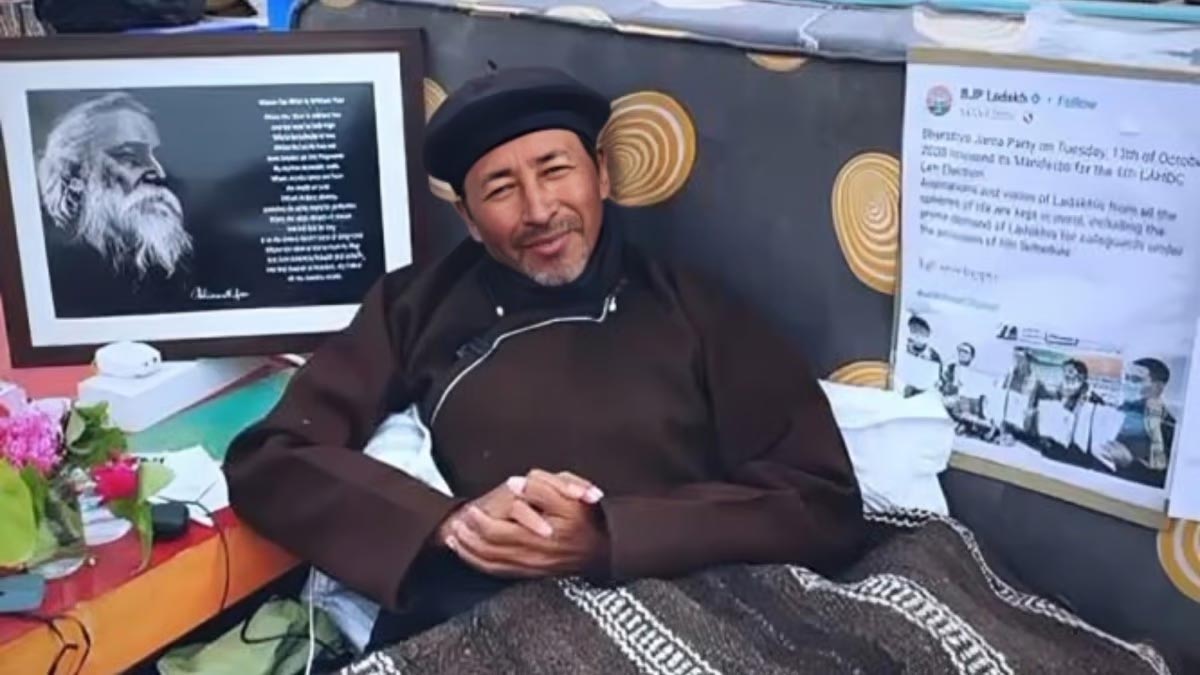Leh: Climate activist Sonam Wangchuk on Wednesday announced the agitation to demand statehood for Ladakh will be intensified and a ‘border march’ will be held on April 7 in the eastern part of the Union territory to highlight ground realities of rapacious development in an ecologically fragile region and alleged encroachments by China.
Wangchuk, who is also part of the Leh-based Apex body that comprises social, religious and political organisations, said they believe in the Gandhian method of Satyagraha in their agitation, which is vital to safeguard the fragile environment of the region and the indigenous character of its population.
“We are followers of (Mahatma) Gandhi’s Satyagraha. We are demanding the fulfilment of the promises made to us by this (BJP) government through its manifestos which led its candidates to win parliamentary polls (in 2019) and hill council polls in Leh (2020),” he told a gathering here.
In November 2023, the Apex Body Leh, a coalition of various social groups, which was formed after the abrogation of Article 370, had expressed several concerns regarding a newly introduced industrial policy by the regional administration. Now it appears that 4,000 acres has been given to an industrial house in incursive and intrusive measure that could be disastrous for the ecologically fragile region. The Apex Body of Leh has asserted that the policy was crafted without the involvement of local stakeholders and posed threats to the region’s delicate environment. Following continuous protests, in January 2024 the Union Home Ministry had formed a high-level committee, led by Minister of State Rai, tasked with safeguarding land and employment opportunities for the residents of Ladakh, according to Live Mint. However, despite several rounds of talks, talks have clearly failed.
Historic Fast begins
For 21 days, Sonam Wangchuk, an engineer by profession, led a hunger strike in the highest plateau in India, Ladhakh (most of it is over 3,000 metres that is 9,800 feet). His demand was simple, he wanted administrative autonomy for his region. Yesterday, on March 26, he ended his hunger fast that he and his colleagues undertook out in the open sky at sub-zero (minus 12 degree Centigrade temperatures). The fast will now be held in relay by colleagues and other s groups, and will continue until the demands of citizens’ groups are met.
#SAVELADAKH #SAVEHIMALAYAS
Sonam Wangchuk appeals to the world to live simply,
starts #ClimateFast of 21 days (extendable till death)
Please watch full video in English here:https://t.co/XHkcIdQQ7b#ILiveSimply #MissionLiFE #ClimateActionNow pic.twitter.com/KQi5EMro9X— Sonam Wangchuk (@Wangchuk66) March 6, 2024
Wangchuk’s announcement on his social media states that the hunger strike will now be taken up by a women’s group. He also stated in his video message, “We are trying to remind and awaken the conscience of Prime Minister Narendra Modi and home minister Amit Shah to safeguard the fragile ecosystems of the Himalayan mountains of Ladakh and the unique indigenous tribal cultures that thrive here. We don’t want to think of Narendra Modi and Amit Shah as just politicians. We would rather like to think of them as statesmen but for that they will have to show some character and far-sightedness.”
END 21st Day OF MY #CLIMATEFAST
I'll be back…
7000 people gathered today.
It was the end of the 1st leg of my fast. Btw 21 days was the longest fast Gandhi ji kept.
From tomorrow women's groups of Ladakh will take it forward with a 10 Days fast, then the youth, then the… pic.twitter.com/pozNiuPvyS— Sonam Wangchuk (@Wangchuk66) March 26, 2024
Wangchuk’s message was packed with emotion.
“End of 21st day of my #ClimateFast. I’ll be back.. 7,000 people gathered today. It was the end of the 1st leg of my fast. Btw 21 days was the longest fast Gandhiji kept. From tomorrow, women’s groups of Ladakh will take it forward with a 10 days fast, then the youth, the the monks, from monasteries…then me again..so on.. The journey has only started. But we still hope n trust we won’t have to do all this. Sooner rather than later a sense of responsible leadership will arise in the PM and HM. (Narendra Modi and Amit Shah).
After his hunger strike of 21 days, Wangchuk is currently under observation at the Leh hospital.
Good that Sonam Wangchuk has ended his hunger strike for now. We need more people like him.
BTW the relay hunger strike is being carried on by other members in his team. Eventually he will take turns to fast again. pic.twitter.com/P1dbm8PWcg
— Anindita (@hatefreeworldX) March 28, 2024
Actor Prakash Raj, in an act of solidarity and substance, visited the protest site at Ladhakh where Sonam Wangchuk has been fasting out in the open sky at sub-zero temperatures (minus 12 degrees centigrade) with at least 100 other fellow Ladhakis. Raj spent his own birthday, March 26, the day of his visit, birthday with Wangchuk and the protestors.
Its my birthday today .. and i’m celebrating by showing solidarity with @Wangchuk66 and the people of ladakh who are fighting for us .. our country .. our environment and our future . 🙏🏿🙏🏿🙏🏿let’s stand by them #justasking pic.twitter.com/kUUdRakYrD
— Prakash Raj (@prakashraaj) March 26, 2024
Speaking to Sabrang India, the next day, on March 27, Prakash Raj, was emotional and focussed, “This is our fight, our struggle; it is the duty of all Indians to fight for this. I have been in the midst of a very busy theatre festival schedule and the only day free was my birthday. There was no better way to celebrate my birthday then to go to Ladakh and express my deep solidarity with this amazing movement. Mr Sonam Wangchuk and his colleagues were already thinking of re-strategizing the rest of the protest and I had a very small part to play in persuading Sonam to call off his fast after 21 days, and for the women and youngsters to now start a relay fast. We are committed now to ensuring that this very fragile region in Ladakh, Leh, is not given over to rapacious development. Already 4000 acres have been given by the government, which doesn’t even care about the fragile climate, or the history and traditions of the Himalayas. We will continue this fight, and we will take it to the south, where I am from.”
Love heals.. love empowers. Love inspires.. thank you for all the love n warmth you showered on me .. keep #Ladakh in your prayers and your thoughts ❤️❤️❤️ #justasking https://t.co/0npHVpZjEY
— Prakash Raj (@prakashraaj) March 27, 2024
Current protests
The protest by several civil society groups has been going on to raise the demand for Ladakh’s statehood and its inclusion into the Sixth Schedule of the Constitution. The Sixth Schedule, under Article 244 of the Constitution, grants constitutional protections to tribal communities and empowers them to establish autonomous development councils. The Sixth Schedule contains provisions related to the administration of tribal areas in Assam, Meghalaya, Tripura and Mizoram through autonomous district councils. These councils have the authority to enact laws relating to the land, public health, and agriculture.
The protestors have also been demanding the implementation of a job reservation policy within the local administration for Ladakhi residents, and the allocation of parliamentary seats for both the Leh and Kargil districts. The demand for statehood has been raised consistently since the abrogation of Article 370 made Ladakh a union territory on August 5, 2019
“The first phase of the hunger strike will be followed by a chain hunger strike by women, youths, religious leaders and elders. On April 7, we will launch a march to Changthang (in the east of Leh along the border with China) like Gandhi’s Dandi March under the Civil Disobedience Movement,” Wangchuk has now said.
He has told the media (reported in Kashmir Times and Deccan Herald) that the Leh-based Apex body will lead the march to highlight the ground realities of Ladakh. Wangchuk alleged that nomads were losing prime pasture land to huge industrial plants to the south and Chinese encroachments to the north.
“The Changthang grazers, famous for producing Pashmina wool, are being forced to sell their animals because over 20,000 acres of grazing land was taken by industrialists to set up their plants… we do not want solar energy at the cost of our people’s livelihood and dislocation,” he claimed.
“They are taking away our land because there are no safeguards available…,” Wangchuk alleged.
Wangchuk questioned the stance of the union government saying that, if the government has nothing to hide, “We will be allowed to proceed but if they stop us from undertaking the march, we will launch a ‘jail bharo andolan’ which will be followed by a non-cooperation movement.”
Stating that the ruling BJP had gone back on its promises to the people of Ladakh, Wangchuk said the representatives of the Apex Body and the Kargil Democratic Alliance (KDA) were left shocked when the Union home ministry straightway rejected their demands on March 4.
“We are seeking our rights and fulfilment of the promises. Parliamentary polls have been announced and the BJP is again making various guarantees to the people but who is going to buy these promises this time,” he said, expressing hope that the government will reconsider its decision and announce statehood to Ladakh.
The Apex Body and Kargil Democratic Alliance (KDA), separate groupings of various political, social and religious organisations, are jointly spearheading the agitation to demand statehood for Ladakh and its inclusion in the Sixth Schedule, and have held five rounds of talks with the home ministry.
What are the climate issues that the fast is about?
Ladakh, known as one of the “water towers of the world” due to its vast glaciers. These glaciers are witnessing a concerning trend as they are rapidly receding. This poses a severe threat to the water supply of millions of people across India. The melting is happening quickly which is partly attributed to increased pollution. According to reports, this pollution is worsened by the increased militarization of the region. This militarisation has been further intensified by the ongoing military tensions between India and China since 2020. Ladhaki’s farmers have also been plagued by Chinese incursions. According to Wangchuk, the Chinese incursions have taken land that was used by shepherds.
A detailed report in Mongabay, Earth Scientist and glaciologist Shakil Ahmad Romshoo has underscored the far-reaching implications of dwindling glaciers. Romshoo has stated that the communities within the Indus basin, including the Union Territory of Jammu and Kashmir, as well as states such as Himachal Pradesh, Punjab, and portions of Rajasthan, Haryana, along with the Union Territory of Chandigarh, are going to bear the brunt of these consequences.
Covering an extensive area of 3,21,289 square kilometres, which is equal to approximately 9.8% of the nation’s total geographical expanse, this basin hosts crucial rivers including the Jhelum, Chenab, Ravi, Beas, and Satluj. The Indus River system, positioned as the westernmost in the subcontinent, holds a great deal of importance for the region’s ecological balance and sustenance of numerous communities reliant on its waters.
An online petition inviting signatures, “Join #FriendsOfLadakh to safeguard Ladakh’s fragile ecology” has now been started by civil society actions to safeguard democracy in Ladakh.
It can be signed at :
Related:
Agitation Likely To Intensify In Ladakh: KDA Calls For Half-Day Strike In Kargil Today
In The Himalayas, Living The Crisis That The IPCC Report Warns Of
The Village Classroom: Rural Indian Women Can Teach About Climate Resilience, Fight For Survival

